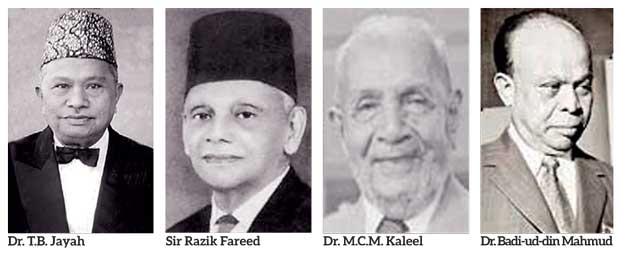The defeat of the Tamil Tigers has finally provided a rare historic opportunity to set our war- battered country on the path to progress. The bitterness and suspicions between the communities remain deep. However, the need to correct past wrongs backed by remedial and reconciliation measures are indispensable to bring communal harmony on the principles of pluralism, equality, mutual understanding and accommodation if we are to move ahead and ensure a better future for all.
Almost three decades of bloodshed and destruction have brought us full circle to the gross realization that the destinies of all communities share common goals and are inextricably interwoven. The earnest desire of every community, Sinhalese, Tamil, Muslim and others, is to live together in harmony. Thus a permanent peace, though still a distant dream, remains the cherished goal of all and, inevitably, the need of the hour is for a political solution for permanent peace.
 In this context the book “Nobody’s People – The Forgotten Plight of Sri Lanka’s Muslims” by well known journalist and author Lather Farook is a timely publication as it highlights the plethora of problems, sufferings and grievances of Sri Lankan Muslims and their pathetic predicament owing to discriminatory policies, Tamil militancy and the failure of the community itself to resolve its burning issues.
In this context the book “Nobody’s People – The Forgotten Plight of Sri Lanka’s Muslims” by well known journalist and author Lather Farook is a timely publication as it highlights the plethora of problems, sufferings and grievances of Sri Lankan Muslims and their pathetic predicament owing to discriminatory policies, Tamil militancy and the failure of the community itself to resolve its burning issues.
As rightly pointed out by the former Chief Justice Sarath N. Silva “Muslims have been a peaceful ethnic group interacting with other religious and ethnic groups, cordially interlinking those cultures with their own culture. They never organized themselves for armed insurrection or destruction”.
Contrary to the common belief that Muslims are a wealthy community, the reality is that around 70 percent of the community lives below the poverty line. More than 130,000 northern Muslims, forcibly and mercilessly driven out from their homes and lands on pain of death by the LTTE, languish in refugee camps in appalling conditions for almost 19 years. Around one percent of the community perished in the tsunami and,adding insult to injury, Muslim survivors were discriminated even in the disbursement of aid that flowed from donor countries.
Muslims were discarded by the now defunct 2002 February Ceasefire Agreement between the government and the LTTE and taken for a ride in the P-TOMS agreement that died a natural death. It is a tragedy that the entire population of Mutur and Thoppur who were 95 percent literate and self-employed were reduced to paupers and made refugees when the LTTE and the Government fought their battle there.
In the East, they face numerous obstacles in trading, farming, paddy cultivation, fishing and  livestock breeding activities jeopardizing their very means of livelihood while, in the rest of the country, poverty, unemployment, educational and several other problems have raised their ugly heads in this gloomy scenario.
livestock breeding activities jeopardizing their very means of livelihood while, in the rest of the country, poverty, unemployment, educational and several other problems have raised their ugly heads in this gloomy scenario.
Despite frustration and privation, Muslims always sought peaceful solutions to their grievances for co-existence with the other communities, notwithstanding diabolical efforts to sideline them. Nor were the Muslims party to the ethnic crisis. They vehemently opposed calls for the division of the country and firmly stood for territorial integrity and unity only to face death, devastation, loss of properties, deprivation of livelihood and displacement with no appreciation from the authorities.
In spite of their miserable plight, it is a travesty of justice that peacemakers, columnists, commentators and others, both here and overseas, call for solutions to the grievances of the Tamils and conveniently ignore the plight of Muslims as if they are non-existent. In the midst of this calamitous situation, there is a growing feeling among the community that Muslim parliamentarians have abandoned them for power and benefits and do not represent their desires and aspirations any more.
Under the circumstances, the book also suggests Muslims should shed disastrous communal politics and join hands with reasonable and moderate mainstream political forces to face challenges under the present unfolding political scenario in the aftermath of the LTTE’s crushing defeat.
Thus, this book seeks redress for the numerous grievances of this downtrodden community, particularly in any initiative to solve the ethnic conflict in the larger interests of the country. It is only by considering each group as stakeholders in any future settlement that we could ensure lasting peace to the country so that all its citizens could live with dignity.
Post Disclaimer | Support Us
Support Us
The sailanmuslim.com web site entirely supported by individual donors and well wishers. If you regularly visit this site and wish to show your appreciation, or if you wish to see further development of sailanmuslim.com, please donate us
IMPORTANT : All content hosted on sailanmuslim.com is solely for non-commercial purposes and with the permission of original copyright holders. Any other use of the hosted content, such as for financial gain, requires express approval from the copyright owners.
 Sri lanka Muslims Web Portal Sri Lanka Muslims News Center
Sri lanka Muslims Web Portal Sri Lanka Muslims News Center
 Donate
Donate


Each and every muslim men and women who are interested to know about our plight should read this
book. The contents of the book emotionalizes the one who read it. The younger generation should be aware of our past so that the present can be understood. Mr L Farook should be commended for bringing out this work after arduous and courageous journey into the realm of fearlessness. May Almighty Allah give you the strength to disseminate more facts to all of us.